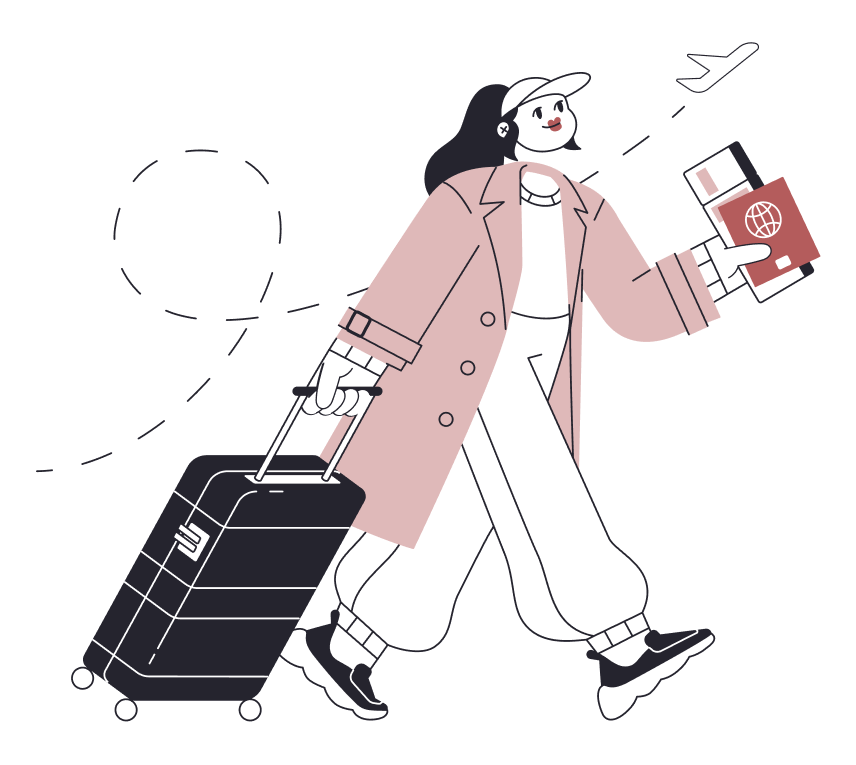A sensory-friendly journaling and planning app that supports solo and neurodivergent travelers by offering a calming, customizable space to reflect, reduce anxiety, and capture meaningful experiences.
Travel Planning for yourself, not the travel industry.
Why do some people need to travel more wisely?
Most travel apps are great at handling logistics, things like bookings, itineraries, and top attractions. But for people who are neurodivergent, anxious, or traveling alone, planning a trip isn’t just about where to go and what to do. It’s also about how the process feels. And too often, that part gets ignored. The whole experience can quickly become overwhelming, noisy, and disorienting, leaving little space for calm or reflection.
Neurodivergent users may especially encounter:
- Sensory overload from traditional app interfaces;
- Anxiety from loosely defined plans or unpredictable environments;
- A strong need for routines, visual previews, and quiet spaces, none of which are supported in most travel planning tools.
Demographic insights:
Gen Z (birth years 1997-2012) often uses travel to:
- navigate identity,
- grow independence,
- improve their mental health.
Carefully planning their travel becomes part of their journey of self-discovery.
Objectives for TripSage:
- Help solo travelers manage anxiety and emotionally prepare for new experiences through gentle, reflective journaling.
- Make travel planning feel calmer and more intuitive, with tools to anticipate challenges and stay organized.
- Create a sensory-friendly space that feels personal, soothing, and easy to navigate.
Table of Contents (and methodology)
Cool business concepts to learn from
What travel and mental health apps are successful in their field?
- Travel e-commerce site
- Vast selection of tours and activities.
- User-friendly search filters
- Flexible cancellation and last-minute options reduce travel risk.
- Mobile-only discounts support budget travel
Pain Points
- Listings may feel overwhelming for quiet, solo traveler.
- Lacks sensory or inclusion filters.
- No emotional/logistical prep support.
- Travel AI site
- Customizable itineraries and co-editing.
- Blends AI logic with blog and user data for authenticity.
- Dynamic memory improves future suggestions.
- Conversational interface to juggle preferences.
Pain Points
- Recommendations not personalized enough.
- Requires heavy user input which may be stressful.
- Emotional health considerations are not supported.
- Symptom & Mood Tracker
- Highly customizable tracking for self-awareness.
- Offers trend analysis to help reflection.
- Privacy-first design with encryption.
- Simple interface for sensory-sensitive users.
Pain Points
- Symptom logging interface can feel like "homework".
- Overwhelming number of categories can be confusing.
- Focuses on reflection and health, not travel planning insights.
Meet Jordan Ellis
persona
"I enjoy solo travel, especially when I’ve planned for the sensory experience. Cities with good transit and walkable areas help everything feel more manageable."
"Quiet, inclusive places for solo travel help me decompress. I need somewhere that feels calm and respectful of who I am."
Personal Information
- Part-time barista and college student, age 23.
- Single, lives alone.
- Creates short trips or budget adventures.
- Heavy tech user, prefers intuitive interfaces.
Goals
- Explore walkable cities with good public transit.
- Minimize uncertainty and stress during travel.
- Stick to a tight budget.
- Find quiet, safe, inclusive places to stay.
Pain Points
- Anxiety spikes when plans change suddenly.
- Overwhelming travel app layouts & notifications.
- Apps have limited accessibility.
- Accomodations are limited to hotel chains.
What happens when AI, a journal, and a travel app meet up?
Spoiler: You get a smarter, calmer way to plan your next adventure.
Time was tight for the TripSage project, so I let AI share the driving.
First, you’ll see my initial ideas and hand-drawn sketches.
Then, I’ll show how I used AI prompts to generate mind maps and key user flows, followed by a prototype based on one of those flows.
My initial hand-sketch for the TripSage sitemap
My design ideas for Gen Z solo travel:
- 1 Designed for dark mode and accessibility first.
- 2 Prompts for journaling, self‑awareness & photos.
- 3 Visual step by step planning, especially for sensitivities.
- 4 Future planning challenges to expand on skills.
AI responses based on clear prompts and a refined concept.
Chat GPT helped me write this TripSage description:
"TripSage is a sensory-friendly journaling and planning app designed for solo travelers and neurodivergent users who want to explore the world on their own terms. Whether you're preparing for a quiet weekend escape or dreaming up a long-term travel goal, TripSage offers a peaceful, customizable space to sort through your thoughts, reduce anxiety, and capture what truly matters."
Based on the text above, FigJam AI created this mind map.
It helped me think more clearly, and I pulled a section from it to define the MVP for TripSage.









